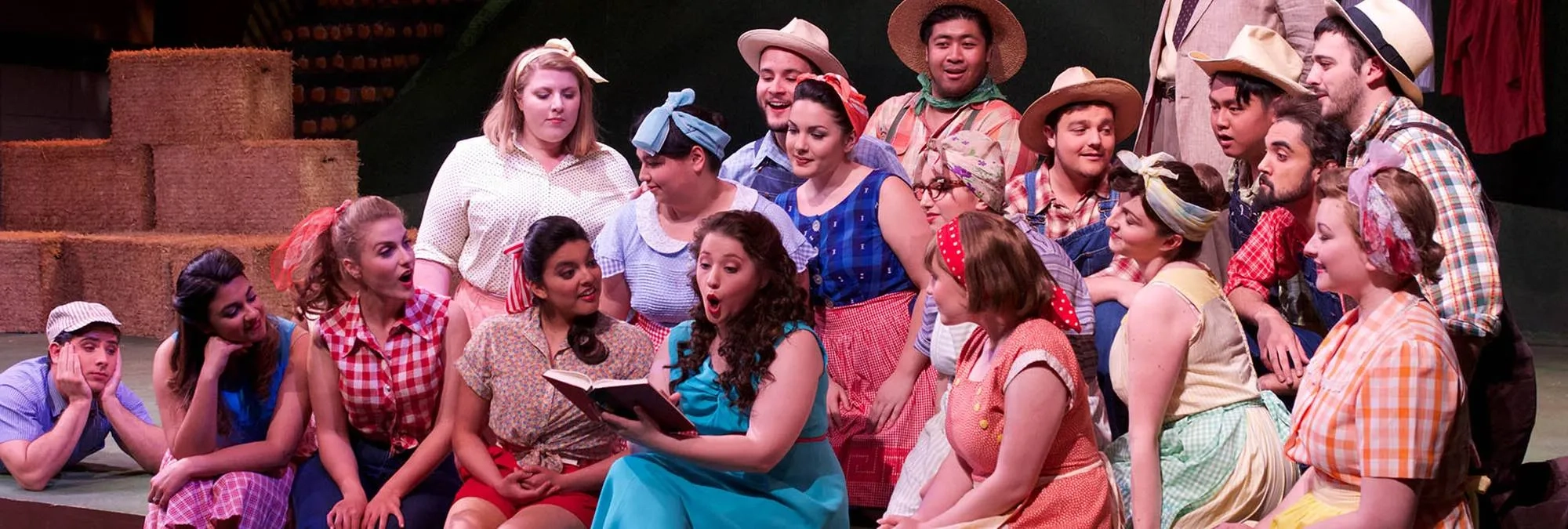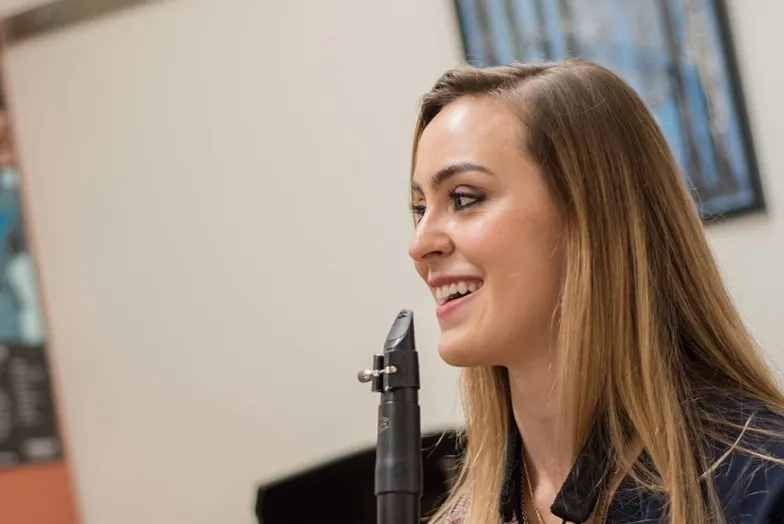Voice Bachelor of Music Curriculum
Collegiate Apply / Request Information
Life isn’t an audition.
Any music school can make you a better player. Our interconnected courses are built to transform you intellectually, artistically, professionally, and individually. You’ll understand the roots of your music, freeing you to take it somewhere new. You’ll see how your training broadens your options, rather than narrowing them. You'll find your voice. And you'll enter the world with the same confidence you bring to the stage.
Required Courses
Curriculum: Bachelor of Music in Voice
Credit Total: 130
| Requirement | Cr. |
|---|---|
| Private Instruction | 32 |
| Performance Classes | 8 |
| Applied Practical Training | 7 |
| Keyboard Skills | 2 |
| Humanities and Sciences | 24 |
| Musicianship and Music Theory | 20 |
| Music History and Literature | 14 |
| Professional Development | 4 |
| Ensembles | 10 |
| Electives | 9 |
| Winter Term | 3 Years |
| Digital Portfolio | 4 Years |
| Juries | 4 |
| Recitals | 1 |
Repertoire Requirements for Voice Majors
Evaluation and Jury Examinations
A jury examination is required of all voice students during the second semester of each year. At the end of the semester in which students are not doing a jury (usually the fall semester), voice students perform a piece chosen by the voice faculty for evaluation. The piece is chosen from the repertoire specified in the Voice Department Handbook. Students will receive written comments on both evaluation and jury performances.
Freshman Requirements
Repertoire requirements for the first semester: Evaluation
- One early Italian song or aria, written in the 17th or 18th century
- One song originally in English (no translations)
- Two pieces of the student's choice (to be approved by the major teacher)
Repertoire requirements for the second semester: Jury
- One early Italian song or aria, written in the 17th or 18th century
- Two songs or arias originally in English. Translations from other languages are not acceptable. (The word "aria" in this context bears in mind particularly the works of Handel, though not exclusively.)
- Two pieces of the student's choice (to be approved by the major teacher)
The freshman jury will consist of a performance of two pieces from the required second-semester freshman repertoire: one piece chosen by the student, the second by faculty jury members.
Sophomore Requirements
Repertoire requirements for the first semester: Evaluation
- Two compositions from the works of such composers as Handel, Vivaldi, Haydn, or Mozart, but not by the same composer. One composition may be a song; the other must be an aria from an oratorio or an opera.
- One song by any of the composers represented in The Reliquary of English Song, e.g., Arne, Dowland, Morley, Purcell
- One song by Beethoven, Mendelssohn, Schubert, or Schumann
- One piece of the student's choice (to be approved by the major teacher)
Repertoire requirements for the second semester: Jury
- Two songs by Beethoven, Bellini, Donizetti, Hensel, Mendelssohn, Mozart, Rossini, Schubert or Schumann. The two songs may not be by the same composer.
- One song by Purcell
- One aria from an oratorio or an opera from the works of such composers as Bach, Handel, Haydn, Mozart or Vivaldi
- One piece of the student's choice (to be approved by the major teacher)
The sophomore jury will consist of a performance of two pieces from the required second-semester sophomore repertoire: one piece chosen by the student, the second by faculty jury members.
Junior Requirements
Repertoire requirements for the first semester: Evaluation
- One song by a composer of the earlier romantic period such as Brahms, Dvořák, Liszt, Mussorgsky, C. Schumann, Wolf
- One song by a French romantic composer such as Berlioz, Bizet, Chabrier, Chausson, Duparc, Fauré, Massenet
- One song originally in English (no translations) by an American or British composer of the 20th or 21st century
- A song from the musical theater/jazz/American standard song repertoire, by a composer such as Berlin, Bernstein, Cahn, Gershwin, Mercer, Porter, Rodgers, Sondheim
- Two pieces of the student's choice (to be approved by the major teacher)
Repertoire requirements for the second semester: Jury
- One song by a composer of the later romantic period such as Berg, Mahler, Strauss, Wolf, early Stravinsky, early Schönberg
- One song by a French composer such as Debussy, Hahn, Satie, Poulenc, Ravel, Milhaud, Messiaen, Roussel
- One composition from the works of J.S. Bach in the original language of composition
- One aria from an oratorio or opera from the works of 19th, 20th, or 21st century composers
- One song in English by an American composer such as Argento, Bacon, Barber, Carpenter, Copland, Duke, Heggie, Musto, Ives, Pasatieri, Persichetti, Rorem
- One piece of the student's choice (to be approved by the major teacher)
The junior student in voice performs a public solo recital of 25–30 minutes of music prior to the second-semester junior jury. The recital may not include any material prepared in previous years and is to be chosen from required junior repertoire enumerated in the Voice Department Handbook. It should include various styles, e.g., romantic, impressionistic, contemporary, American, and at least three languages, one of which must be English by an American composer.
The junior jury will consist of a performance of two pieces from the required second-semester junior repertoire: one piece chosen by the student, the second by faculty jury members.
Senior Requirements
The senior student in voice performs a public solo recital of 50–60 minutes of music. The recital may not include any material prepared in previous years and should include pieces in Italian, German, French and English, from the baroque or classical, romantic, impressionistic, or neo-classical and contemporary (twentieth and twenty-first centuries) periods. Two of the contemporary compositions must be by American composers and be drawn from settings of English words. The remaining contemporary pieces may be drawn from the works of such composers as Berg, Britten, Schönberg, et al.
The program must be approved by the major voice teacher, and a portion of the recital may be presented to the voice faculty at least four weeks prior to the recital date during a recital preview. The voice faculty will either approve the memorized recital or ask for a second preview. If the second preview is not approved, the recital must be rescheduled for a later date.
Materials for the program must be turned in to the major teacher and voice faculty for their review. This must include the recital repertoire (including opus numbers and composers' dates), translations, program notes (limited to 150 words per piece on the program) and an optional biography of the singer (limited to 150 words or less).
The repertoire must be equally balanced among the Italian, German, French, and English languages. Other languages may be included only after the 50-minute minimum of the preceding four languages has been satisfied. The following periods and styles are to be represented:
- Baroque and/or classical
- Romantic
- Impressionistic, neo-classical, post-romantic, etc. This category includes any works from or comparable to the works of the following suggested composers: Debussy, Ravel, Satie, Roussel, Milhaud, Poulenc, Messiaen, Stravinsky
- 20th or 21st century. Two of these compositions must be by American composers such as Argento, Barber, Copland, Ives, Pasatieri, Persichetti, Rorem
Operatic and oratorio arias may be programmed in fulfillment of any of the above requirements. They are not to make up a significantly large portion of the senior recital, however.
Song cycles: Although parts of cycles may have been performed in previous years, the major portion of the repertoire must be prepared during the senior year. Songs chosen for encores must be approved by the major teacher in advance of the recital date.
At the discretion of the major teacher, an optional piece/set from the musical theatre/jazz/American standard song repertoire by a composer such as Berlin, Bernstein, Cahn, Gershwin, Mercer, Porter, Rodgers, or Sondheim, may be included. This does not replace any required repertoire.
The recital preview will be the senior jury; an exit evaluation will be required at the end of the semester, consisting of one piece chosen by the student.
All recital and jury materials are to be prepared under the guidance and with the approval of the major voice teacher.




